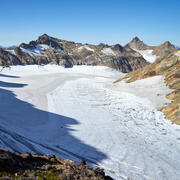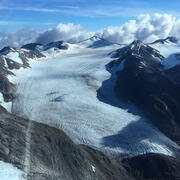Glacier Studies
Glacier Studies
Filter Total Items: 8
Glaciers and Landscape Change
Mountain glaciers are dynamic reservoirs of frozen water, deeply interconnected with their surrounding ecosystems. Glacier change in North America has major societal impacts, including to water resources, natural hazard risk, tourism disruption, fisheries, and global sea level change. Understanding and quantifying precise connections between changing glaciers, the surrounding landscape and climate...
Lemon Creek Glacier
Lemon Creek Glacier is located in the high-latitude maritime region of Alaska, at the southernmost tip of the Juneau Icefield. Glacier observations began at this site in 1953.
Gulkana Glacier
Gulkana Glacier is located in the high-latitude continental climate regime of Alaska’s Delta Mountains. Glacier observations began at this site in 1966.
Additional Research Glaciers
Black Rapids, Columbia and Hubbard glaciers are also researched by the USGS.
Wolverine Glacier
Wolverine Glacier is located in the high-latitude maritime climate regime of Alaska’s Kenai Mountains. Glacier observations began at this site in 1966.
Biogeochemistry of glaciers
Significant change to the Arctic and sub-arctic water cycle is underway, impacting hydrologic and biogeochemical fluxes. In southcentral Alaska, glacier mass loss, changes to precipitation (including the rain/snow fraction), thawing ground ice, and vegetation encroachment will change both magnitude and timing of water and solute fluxes downstream. Although altered fluxes of limiting nutrients are...
Arctic – Boreal Catchment Studies
Catchment hydrology focuses on the movement of water and solutes from landscapes to waterbodies. Our research addresses questions such as: Where is the stream water coming from? How long did it take to get here? What solutes, nutrients, and/or contaminants did the water pick up along the way? Because streams and lakes gather water and solutes, we can learn about the entire watershed by studying...
Wolverine Glacier Ecosystem Studies
This project is an extension of the long-term Wolverine Glacier Benchmark Glacier project and is improving our understanding of solutes and nutrients in glacier basins, and how they fuel downstream ecosystems.









